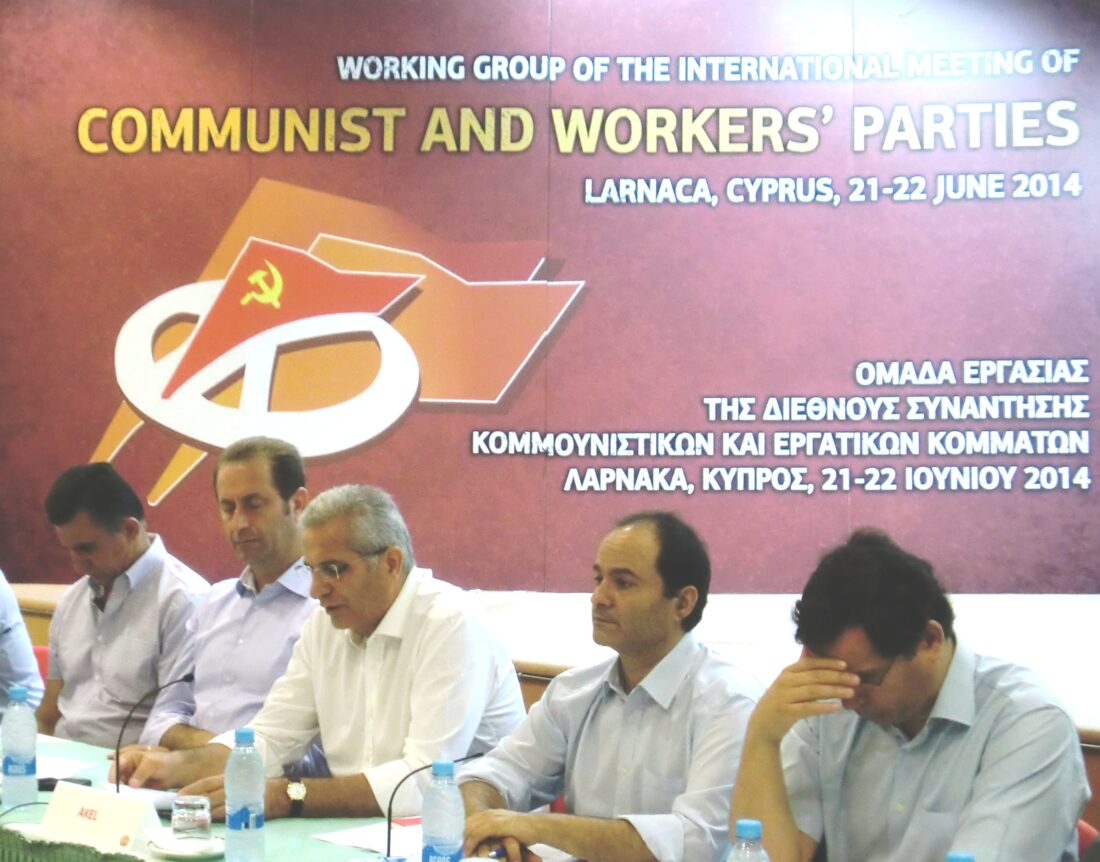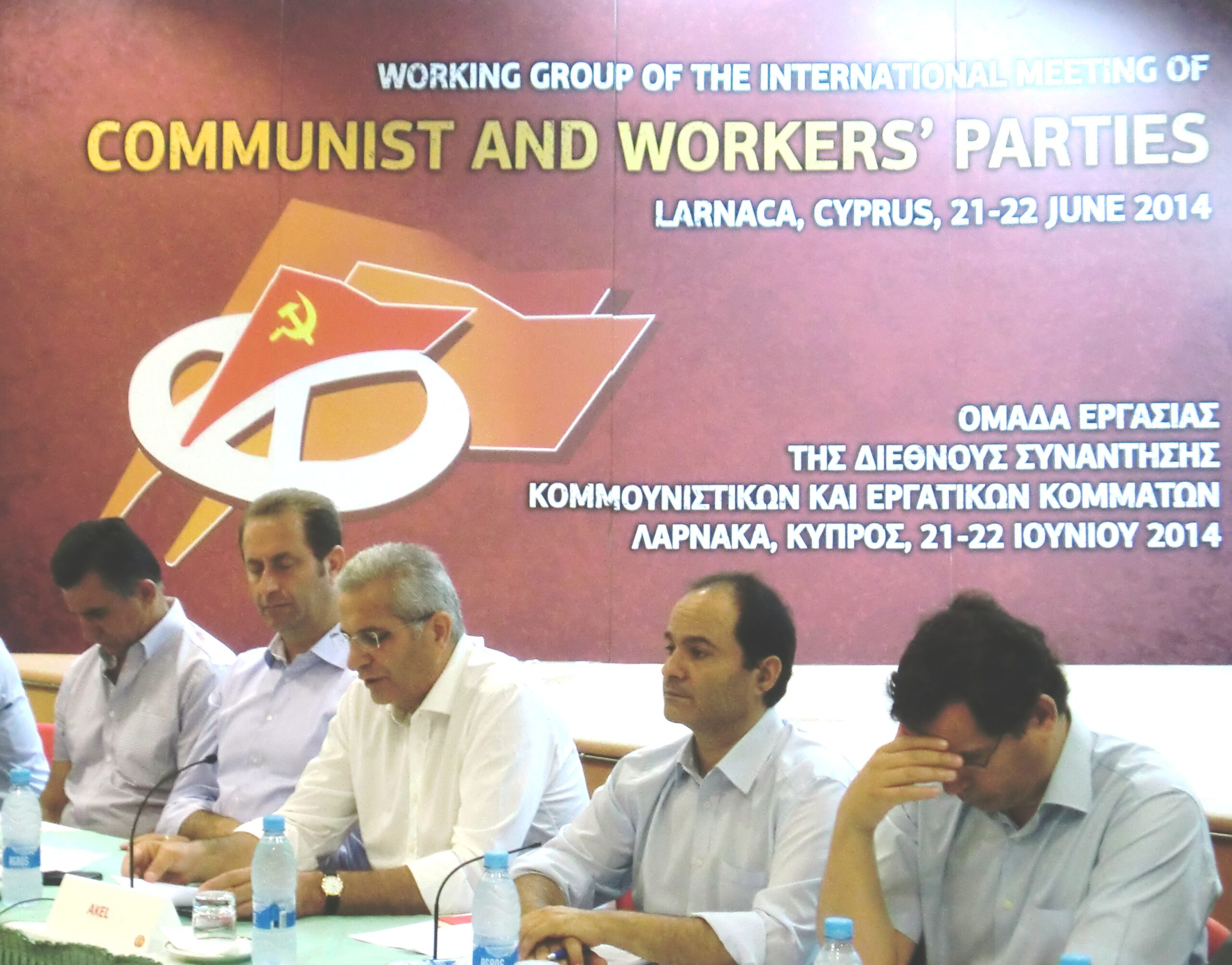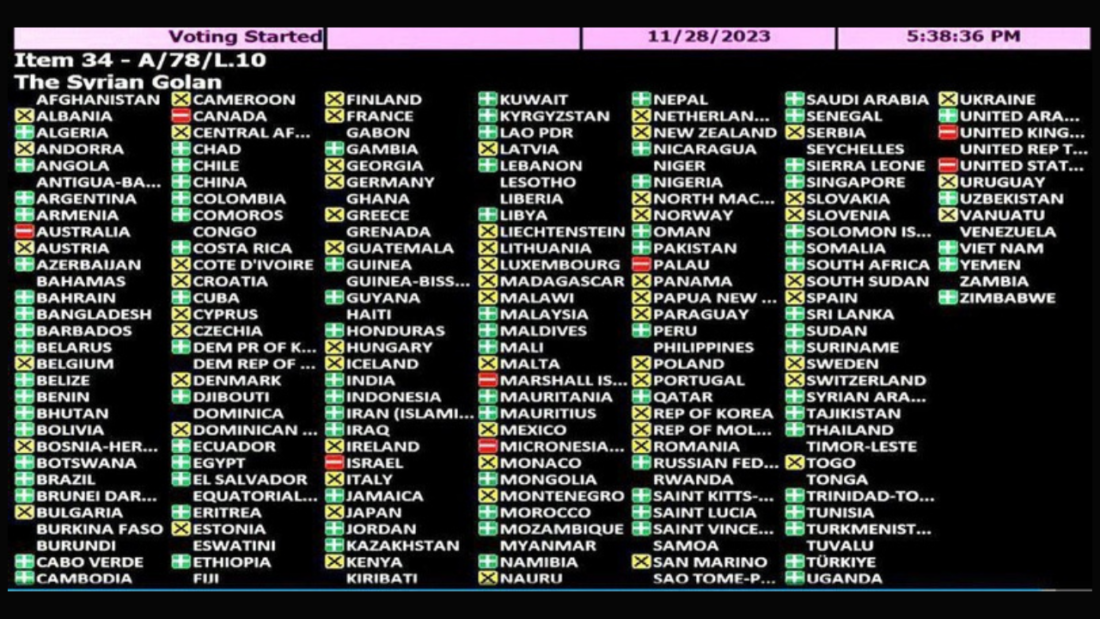
Intervention of Andros Kyprianou, General Secretary of the C.C. of AKEL, at the Meeting of the Working Group of the International Meeting of Communist and Workers Parties
AKEL C.C. Press Office, 21st June, Pervolia, Larnaca, Cyprus
 On behalf of the Central Committee of AKEL allow me to welcome you all, to Cyprus and wish you a good, pleasant and productive stay. I hope the preparatory meeting of the Communist and Workers’ Parties will be successful. This is especially important bearing in mind the difficult conditions the peoples in various countries are going through, indeed the whole world. The world today is characterized by the frequent violations of International Law, foreign interventions in the internal affairs of sovereign states and the attempt to impose the view of the imperialists in many parts of the world, resulting in entire countries being driven to civil war and never-ending bloodshed. At the same time, under the pretext of the global economic crisis, anti-social policies against the people and their interests are being promoted which are characterized by austerity, the curbing of working people’s and pensioner’s rights and gains and the selling off of public wealth.
On behalf of the Central Committee of AKEL allow me to welcome you all, to Cyprus and wish you a good, pleasant and productive stay. I hope the preparatory meeting of the Communist and Workers’ Parties will be successful. This is especially important bearing in mind the difficult conditions the peoples in various countries are going through, indeed the whole world. The world today is characterized by the frequent violations of International Law, foreign interventions in the internal affairs of sovereign states and the attempt to impose the view of the imperialists in many parts of the world, resulting in entire countries being driven to civil war and never-ending bloodshed. At the same time, under the pretext of the global economic crisis, anti-social policies against the people and their interests are being promoted which are characterized by austerity, the curbing of working people’s and pensioner’s rights and gains and the selling off of public wealth.
Confronted with this onslaught of anti-social attacks the Left has an obligation to resist, organize, cooperate and lead the struggles of the peoples for resistance, dignity and to open up a perspective for the future.
We wish the Meeting being held in Cyprus will contribute towards this end. AKEL considers that the greatest possible understanding and readiness for discussion and joint action must be shown. We are united by our ideology, as well as the struggle on the side of the working class and our peoples. We are connected by international solidarity in the conditions of the imperialist order. We consider that the need for the coordination of activities, for joint analysis, even with the diversity that can distinguish our parties has not been surpassed. In our opinion we are duty bound to work hard in a spirit of mutual understanding to strengthen, to the degree this is feasible, the cooperation between us, even our joint intervention in international developments.
The Working Group is convening almost one month after the European Elections, which represent an important reflection of the political situation and socio-political trends within the Member States of the EU. I point out from the start the crucial element of the abstention of the people in the EU in the European elections, which has almost reached 57%. This is not down of any single factor, nor is there a simple explanation.
The ruling forces of the system – both the Right and the Social Democrats – have registered a slight reduction. However, this has not led to a radical change in the balance of forces. The rise of xenophobic nationalist parties in major Member States of the European Union is extremely worrying, which under the cloak of Euroscepticism are in essence proposing an even more reactionary recipe of managing capitalism. The fact that for the first time openly neo-Nazi fascist parties have now entered the European Parliament is also a horrendous sign of the times.
Regarding our own class spectrum, the Communist and Workers’ Parties, in general terms, have maintained their forces. At the same time, there was increase in the forces of the political parties participating in the Group of the European United Left/Nordic Green Left in the European Parliament, which of course besides the Communist and Workers’ Parties, also includes parties of the broader, but also ecological left.
Our own assessment is that the existence of the Group of the Left, despite the serious difficulties it is facing, was up till now a bastion of struggle for the workers movement in Europe. All through these years, it was the only voice inside the European Parliament in favour of the interests of the working people of the EU Member States; the only voice on the side of the struggling peoples of the world, for peace and international solidarity. We believe that if the autonomy of the parties participating in GUE/NGL, the mutual respect between them and the respect of the confederal character of the Group is safeguarded, it can continue to play, within its possibilities, a positive role in European parliament affairs.
The developments envisioned in Europe demand a powerful response from the peoples of Europe. In the period immediately ahead of us, the New Framework of Economic Governance of the European Union, which imposes a stranglehold on the economies of the Member States, will be enforced in order to further curb working people’s gains to the benefit of capital. The economic recovery that the Directorates of Brussels and the governments of the member states are preparing will be imposed on the destruction of popular and social gains. At the same time, our continent is being militarised with foreign bases and nuclear weapons, whilst the militaristic and economic interventionism of the European Union is intensifying all over the world. We can also see this in the dramatic developments taking place in Ukraine. Anti-communism is being institutionalised and fascism is raising its head. Democratic and trade union freedoms and individual rights are being curbed in the face of the policies promoting a police state and the surveillance/filing of people.
In view of these developments, the Communist and Workers’ Parties of our continent are entrusted with enormous responsibilities to again inspire and organize the resistance and struggles of the working people. Apart from the leading role the Communist parties must play, when of course they win working people’s hearts and minds, we have the duty to unite the broad working and popular strata; to rally and bring together broader progressive forces on a line that combines the struggle for the immediate and day-to-day problems of the peoples of Europe, the struggle against fascism and imperialist interventions, together with the perspective for deeper, progressive and even revolutionary changes in our continent.
As AKEL we are inspired by the glorious history of the communist and workers’ movement in Europe and seek to integrate the lessons from the positive and negative experiences of the European revolutionary movement in our policy, from the militant heritage of the peoples of our continent, but also of the whole world as well.
As we all know this year four decades will have passed since the Turkish military occupation of Cyprus. Four decades since the twin, treacherous crime committed by imperialism and Turkey against Cyprus and its people, namely the treacherous coup d’état and subsequent Turkish invasion, the Cypriot people are still struggling for their vindication.
For some days now the bi-communal talks for a solution of the Cyprus problem under UN auspices have entered a substantive stage. The effort for a solution dates back from the beginning of 2008, immediately after the election of Demetris Christofias as President of the Republic and in reality it was suspended on the responsibility of the Turkish side at the beginning of 2012.
Between 2008-2010, when the negotiators were Demetris Christofias and Mehmet Ali Talat, significant progress was achieved on three of the six chapters of the Cyprus problem: Governance and Power Sharing (this is the biggest, particularly important and complex chapter), European Union Affairs and issues relating to the Economy. Regarding the remaining three chapters (Property and Territorial issues, Security and Guarantees) significant progress was not registered. One of the reasons for the lack of progress on the specific issues was that the Turkish Cypriot side was unwilling to discuss before the final stage the chapter on the territorial issue, which is inextricably linked to the property issue and consequently it was extremely difficult for this chapter too not to be adversely affected.
Regarding the issue of security and the guarantees, third countries (Greece, Turkey and the United Kingdom) are involved in a conventional way and only with their participation within the framework of a wider international conference can it be resolved definitively. This, however, does not preclude its discussion in the inter-communal negotiations. On the contrary, such a development prepares the ground for a successful outcome of the conference, which can only be convened after the solution of the internal aspects of the Cyprus problem. The Turkish side regretfully refused to do this.
In April 2010 Mr. Eroglu assumed the leadership of the Turkish Cypriot community. A meeting of the two leaders with the UN Secretary-General in Geneva followed, where both leaders made the commitment to continue the negotiation from where it had left off with the convergences. Unfortunately, Mr. Eroglu did not respect the commitment made and subsequently rejected the more substantive from these convergences. Naturally, both former President Christofias, as well as the team of the United Nations, insisted on the respect of the convergences. Coming under this pressure subsequently Mr. Eroglu gradually left the negotiating table, invoking the Cypriot Presidency of the European Council.
After the election of Mr. Anastasiades to the Presidency of the Republic in March 2013, the UN team submitted a paper registering the convergences achieved in the period between 2008 -2012. Despite AKEL’s secondary observations, we consider that the convergences are recorded in an objective way. The position of AKEL was and remains that the convergences must be respected and that the discussion of the outstanding and pending core issues should continue. We believe that a possible negotiation from the beginning would be lengthy and would not lead to convergences.
Regretfully, at least so far, AKEL has not been heeded. After a logical period of grace granted, which was given in order to address the enormous economic problems caused by the unprecedented and completely insane decision of the Eurogroup of 15th March 2013 for the haircut on bank deposits, a needless adventure to draw up a joint communique started. There was no reason to do this since two Christofias – Talat joint communiques existed beforehand that set out the basis of negotiation. As a result, valuable time was lost and the result was a joint communiqué inferior in substance and quality than the previous ones agreed, mainly with regards the issue of the indivisible sovereignty of the federated state. There followed a phase of exploring the positions of each side (screening). For AKEL it was not surprising that with the completion of this procedure a significant widening of the gap between the positions of the two sides was noted.
As I have mentioned previously, the negotiation has just entered its second and crucial stage. Although reliable conclusions about the prospects of the negotiation process still cannot be drawn, I will not hide the fact that we are concerned. Mr. Eroglu is miraculously and all of a sudden presenting himself as a fanatical supporter and fervent preacher of the convergences. Indeed, he is accusing the Greek Cypriot side that it wants to commence negotiations from the scratch. It is obvious that Mr. Eroglu is exploiting President Anastasiades’ weaknesses to create impressions in order to unequivocally declare that he is committed to the continuation of the talks from where they had left off.
AKEL supports the negotiation procedure because it is the only available way to achieve a solution of the Cyprus problem. This does not mean that we are not concerned. Nor does it mean that we are giving a blank check to President Anastasiades to act as he sees fit. We are encouraging him to safeguard all that has already been agreed and move decisively forward based on principles, seeking convergences on the remaining core issues. At the same time, we do not hesitate to criticize him in the cases where he deviates from this approach.
The comprehensive solution of our political problem is today more necessary than ever. We are struggling for a solution based on the principles of International Law, on the principles upon which the European Union is founded, and on the 1977 and 1979 High-Level Agreements; for a solution that shall safeguard the single sovereignty, single international personality and single citizenship of the United Cyprus Republic; for a bi-communal, bi-zonal federation with political equality as set out in the relevant United Nations Security Council resolutions; for a solution that will safeguard the human rights and fundamental freedoms, including the right of the refugees to return to their homes and properties; for a solution that provides for the withdrawal of the occupation troops and settlers, whose number already exceeds that of the Turkish Cypriots in the occupied areas.
I would also like to make a special reference to certain newly conceived concepts within the Greek Cypriot side arguing for the abandonment of the principle of demilitarization and in favour of Cyprus applying for membership of the Partnership for Peace or even of NATO itself. The argument that this is imperative so that Cyprus can participate in the Common Foreign Security Policy of the European Union and more specifically in the EU’s military operations is inaccurate and misleading. Cyprus fully participates in all areas of competences of the European Union and only in operations of the type such as “Berlin Plus”, that is to say where NATO infrastructures are used, which is the exception rather than the rule, we cannot participate.
We cannot forget the role played by NATO in the tragedy of Cyprus, but also today in many regions of the world. Nor can we also ignore the fact that if we would have an army, this would strengthen Turkey’s long-standing goal to also keep its own troops on our island. In addition, if we will have an army it would be federal and therefore mixed, with the evident danger of it being used by external forces aiming at promoting destabilisation, something that happened repeatedly in the past.
Grasping the opportunity and having in mind coordinated scheming and machinations, I would like to send out a very clear message to many recipients, both within Cyprus and abroad: AKEL, as a genuine and consistent patriotic left political force, will not consent to a solution that shall include Cyprus’ accession to NATO or/and deviating from the principle of demilitarization. Let those who are seeking such machinations measure their strength, as they must make the solution accepted by the people without us. And it would really be a shame to endanger the cause of the solution of the Cyprus problem just to satisfy the ideological fixations of certain circles and forces.
Given the great difficulties, we believe that ten years after the 2004 referenda, in the current realities a new objective combination of circumstances are appearing that can be utilised in the direction of the solution of the Cyprus problem. In the past, it was the imminent accession of the Republic of Cyprus to the European Union, in combination with Turkey’s European perspective. That coincidence of circumstances has faded. Turkey now understands that the Cyprus problem is not the only obstacle to its European ambitions, whilst the unprecedented economic crisis in the Eurozone makes the Turkey’s accession perspective less attractive. In addition, Erdogan used Turkey’s European course as a shield to protect himself and his party from the “deep state” and military establishment. It has now won the battle and whatever reactions come from the Turkish people and certainly not from the “deep state”. Consequently, it has been confirmed for the umpteenth time that circumstances come and go and the duty of the political leadership is to understand and try to timely utilise them in the right direction.
Today’s combination of events is none other than the identification of significant natural gas deposits in the Exclusive Economic Zone of the Republic of Cyprus, whilst the prospect for much larger amounts to be found is realistic. This reality has shaken up and created mobility throughout the region. Turkey acquires an important incentive for a solution of the Cyprus problem since it knows very well that this is the only existing peaceful way for both our Turkish Cypriot compatriots and Turkey itself to benefit from this valuable product. However, we too know that the unobstructed utilization of the natural gas demands conditions of peace, stability and cooperation.
I want to assure you that a solution of the Cyprus problem and the lifting of the partitionist and dangerous status quo is a top priority for AKEL. The available combination of events should not be lost. I am sure that in our enormous effort, whose successful outcome does not depend solely on us, we will gain assistance and find support from the international community. Your solidarity in this noble goal is invaluable and we consider it given.




